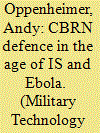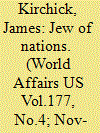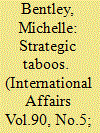|
|
|
Sort Order |
|
|
|
Items / Page
|
|
|
|
|
|
|
| Srl | Item |
| 1 |
ID:
135594


|
|
|
|
|
| Summary/Abstract |
Several conflicts, most notably in the middle east, are providing the backdrop for the first use of CBRN weapons in a generation. One hundred years after its first use of a chemical weapons (CW) in WWI effectively the world first weapons of mass destruction (WMD), chlorine gas in barrel bombs was air dropped on rebel-held areas in Syria.
|
|
|
|
|
|
|
|
|
|
|
|
|
|
|
|
| 2 |
ID:
135838


|
|
|
|
|
| Summary/Abstract |
The United States’ attempt to deter chemical weapons use by the Syrian government failed largely due to the former's lack of credibility. Having seen its implicit deterrent threats ignored in spring and summer, 2013, the United States scrambled to restore them by threatening to use force explicitly, only to find that its credibility was exhausted. Syria's subsequent pledge to give up its chemical weapons, popularly explained as a response to renewed U.S. threats, likely reflected a strategic environment changed more by developments in Syria than any application of U.S. deterrent strategy.
|
|
|
|
|
|
|
|
|
|
|
|
|
|
|
|
| 3 |
ID:
134848


|
|
|
|
|
| Summary/Abstract |
Can there be any doubt that Israel is the most reviled country in the world today? No other nation engenders as much scorn, whether measured in newspaper column inches, street protests, or computer pixels. The only aspect of the hatred more disturbing than its virulent omnipresence is how out of proportion it is to Israel’s real (and alleged) wrongdoing. North Korea functions as a vast gulag, Syrian President Bashar al-Assad deploys chemical weapons on children, and the Castro brothers have ruled despotically over their Cuban island fiefdom for five decades running, but none of these dictatorial regimes invite anywhere near the scrutiny, never mind spittle-flecked loathing, engendered by the Jewish democratic state. A majority of Europeans, according to polls, consider this tiny country of eight million people to be the greatest threat to world peace. An Israeli soldier fires a rubber bullet in the West Bank and it will generate venomous crowds in cities around the globe; Iranian paramilitary basij forces murder peaceful demonstrators in broad daylight and the world emits barely a peep of protest.
|
|
|
|
|
|
|
|
|
|
|
|
|
|
|
|
| 4 |
ID:
134483


|
|
|
|
|
| Summary/Abstract |
This article examines US President Barack Obama's foreign policy rhetoric on Syria, specifically in relation to the threat of chemical weapons and the prohibitionary taboo surrounding their use. It contends that Obama's rhetorical construction of the taboo is not simply a commitment to the control of these horrific weapons (where such arms have been comprehended as so extensively vile as to preclude their employment), but that this also represents the strategic linguistic exploitation of these normative ideals in order to directly shape policy. By analysing of presidential speeches made during the conflict, it demonstrates that Obama has manipulated pre-existing conceptions of chemical weapons as taboo, and also as forms of weapons of mass destruction, to deliberately construct policy in line with his own political ambitions—most notably as a way of forcing a multilateral solution to the situation in Syria. This article challenges existing perceptions of the chemical weapons taboo as an inherently normative constraint, arguing that this instead comprises a more agency-driven construct. Static notions of the taboo must be abandoned and subsequently replaced with a framework of understanding that recognizes how the taboo can be used as a deliberate driver of foreign policy.
|
|
|
|
|
|
|
|
|
|
|
|
|
|
|
|
| 5 |
ID:
136001


|
|
|
|
|
| Summary/Abstract |
Just one year after Syria’s formal accession to the Chemical Weapons Convention (CWC), the Organisation for the Prohibition of Chemical Weapons (OPCW), the international body responsible for implementing the treaty, announced this October that almost all of Syria’s declared chemical agents and precursor chemicals had been safely and irreversibly destroyed.[1]
Workers in protective clothing carry a dummy grenade into a bunker during a media day at the GEKA facility in Münster, Germany, on March 5. The liquid waste from the neutralization of Syrian sulfur mustard agent aboard the MV Cape Ray was brought to the GEKA facility last summer for further treatment. (Nigel Treblin/Getty Images)Workers in protective clothing carry a dummy grenade into a bunker during a media day at the GEKA facility in Münster, Germany, on March 5. The liquid waste from the neutralization of Syrian sulfur mustard agent aboard the MV Cape Ray was brought to the GEKA facility last summer for further treatment. (Nigel Treblin/Getty Images)This was an enormously ambitious and difficult effort, especially in light of the ongoing civil war in Syria, the refusal of Syria to cover the costs of demilitarization, the strong reluctance of any other country to destroy the Syrian chemical stockpile on its territory, and the ongoing allegations of continued and indiscriminate chemical weapons use against rebel forces and civilian populations in Syria
|
|
|
|
|
|
|
|
|
|
|
|
|
|
|
|
| 6 |
ID:
135584


|
|
|
|
|
| Summary/Abstract |
The article focuses on advancements and changes in military training and education methods and techniques and mentions that biggest change in soldier training is mainly due to development in computing and simulation technology. Topics include the Weapon Effects Simulations (WES) technology that include pyrotechnics triggered by laser or radio; chemical, biological, radiological and nuclear defense as a major consideration during soldier training; training devices for armored fighting vehicles.
|
|
|
|
|
|
|
|
|
|
|
|
|
|
|
|
|
|
|
|
|